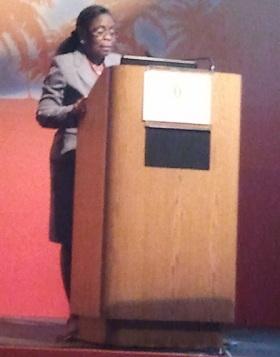Using AI to control energy for indoor agriculture
30 September 2024
Published online 6 December 2011

African nations need to raise cancer awareness and develop its local research capacities to tackle its increasing cancer burden, contend researchers at the African Organization for Research & Training in Cancer (AORTIC)'s 8th International Cancer Conference, held in Cairo, Egypt for the week following 28 November 2011.
"What works in Los Angeles, doesn't have to work in Africa," says Joe Harford, director of the Office of International Affairs at the US National Cancer Institute (NCI). High-quality research that suits Africans is essential in the fight against cancer, he adds.
In order to promote more cancer research in Africa, the NCI and AORTIC launched the BIG CAT initiative (Beginning Investigator Grant for Catalytic Research) to support local African scientists Africa. "We did not get any [applications] from North Africa which was very disappointing. All we ask of researchers is to send a letter of intent of two pages telling us why they need the grant," said Harford.
Cervical cancer is the most common type of cancer affecting women in Africa. "We need more research [to develop] low cost and effective methods of secondary prevention and screening for human papillomavirus (HPV)," said Rose Anorlu, a gynecologist at Lagos University in Nigeria, during her presentation.
According to Anorlu, cervix cancer spreads in Africa owing to cultural norms that are hard to change, such as marrying at a young age and polygamy. Other problems include poor treatment of infections, chronic inflammations and compromised immunity, such as in people living with HIV/AIDS.
"HPV causes 99.7% of cervical cancers and is endemic in Africa," said Anorlu. Education and spreading awareness in local communities can help curb the transmission of the virus, in addition to promoting HPV vaccination for women.
Social stigma, along with the shortage of well-trained healthcare professionals can complicate efforts to curb the spread of breast cancer in Africa, suggests Harford. "Some women came in for clinical diagnosis in very late stages, because they feel ashamed to admit that they have a problem."
African nations will need to tackle breast cancer according to the realities on the ground, he adds. "There's a campaign to increase the availability of mammograms in Egypt." However, only 1% of women in Egypt who should be being screened for breast cancer are receiving mammograms. To make this a reliable option to reduce breast cancer, this needs to be raised to 90%.
Harford advises that spreading awareness and knowledge about the breasts' anatomy, so that women can check their own breasts for any abnormal lumps or growth, would be a better option in Africa than mammography for the early detection of breast cancer.
doi:10.1038/nmiddleeast.2011.163
Stay connected: